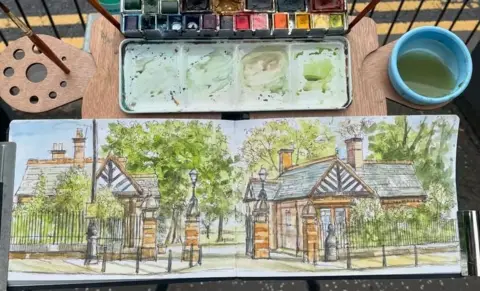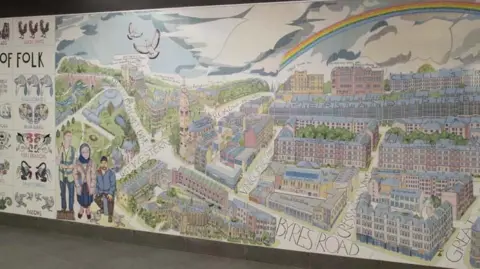- Trends
The relationship between humans and AI
时间:2010-12-5 17:23:32 作者:Soccer 来源:Baseball 查看: 评论:0内容摘要:The fierce battle over artificial intelligence (AI) and copyright - which pits the government against some of the biggest names in the creative industry - returns to the House of Lords on Monday with little sign of a solution in sight.The fierce battle over artificial intelligence (AI) and copyright - which pits the government against some of the biggest names in the creative industry - returns to the House of Lords on Monday with little sign of a solution in sight.
Perhaps to an extent both those things are true.The Department for Science, Innovation and Technology say that they're carrying out a wider consultation on these issues and will not consider changes to the Bill unless they're completely satisfied that they work for creators.

If the "ping pong" between the two Houses continues, there's a small chance the entire bill could be shelved; I'm told it's unlikely but not impossible.If it does, some other important elements would go along with it, simply because they are part of the same bill.It also includes proposed rules on the rights of bereaved parents to access their children's data if they die, changes to allow NHS trusts to share patient data more easily, and even a 3D underground map of the UK's pipes and cables, aimed at improving the efficiency of roadworks (I told you it was a big bill).

There is no easy answer.Here's how it all started.

Initially, before AI exploded into our lives, AI developers scraped enormous quantities of content from the internet, arguing that it was in the public domain already and therefore freely available.
We are talking about big, mainly US, tech firms here doing the scraping, and not paying for anything they hoovered up.It follows Meta incorporating an AI service into its messaging service, WhatsApp - a development it was
after grumbling from users.Media analyst Hanna Kahlert at Midia Research told BBC News the move followed the pattern of "social and AI trying to absorb each other".
She said it was not, however, necessarily what customers actually wanted."Users primarily still use social platforms to talk to their friends, and see their friends' updates," she added.
- 最近更新
- 2025-07-07 11:28:39What is a debt consolidation loan — and can it help you lower your interest rate?
- 2025-07-07 11:28:39What’s the average Social Security payment in 2025? Plus: Changes for 2025 and 2026
- 2025-07-07 11:28:39Players and fans at the Club World Cup are coping with high temperatures as a heat wa…
- 2025-07-07 11:28:39Should you use a home equity loan to pay for medical bills?
- 2025-07-07 11:28:39My mom’s famous Greek pasta salad is always a hit
- 2025-07-07 11:28:39Best personal loans for 2025: 7 editor picks for consolidating debt, improving your home and more
- 2025-07-07 11:28:39What is a reverse mortgage? How it works, who it’s best for — and when you should steer clear
- 2025-07-07 11:28:39My mom’s famous Greek pasta salad is always a hit
- 热门排行
- 2025-07-07 11:28:39Royal Caribbean's private island in the Bahamas
- 2025-07-07 11:28:39What’s the average Social Security payment for May 2025? Plus: Changes for 2026
- 2025-07-07 11:28:39How to get a defensive driving discount on your auto insurance
- 2025-07-07 11:28:39Business InsiderWhy markets are going to have to worry about tariffs again soon
- 2025-07-07 11:28:39How the Federal Reserve affects mortgage rates
- 2025-07-07 11:28:39What is a personal loan? How it works — and what to know before you apply
- 2025-07-07 11:28:39Zucchini Fritters (Fritelle Di Zucchini)
- 2025-07-07 11:28:39CNN BusinessWhy gasoline prices aren’t tumbling along with sinking oil
- 友情链接
- 'No plans for hosepipe ban', says water company UK exposes Russian cyber campaign targeting support for Ukraine A letter from the M&S hackers landed in my inbox - this is what happened next How AI is transforming work for Bee Lady doctors Olly Murs pulls plug on Glasgow show in stage walk-off The world's most dangerous country for trade unionists Jethro's J35 TER number plate sells for £30.5k The divides behind the scenes in the Vatican ahead of the conclave Nature inFocus Photography Awards 2024: Leopards, sharks and spiders Man in Norway wakes to find huge container ship in garden US Treasury confirms the end of the penny Man charged following police chase car crash on M4 Your pictures on the theme of 'my best photo' The secretive US factory that lays bare the contradiction in Trump's America First plan The camera tech propelling shows like Adolescence Gary Lineker: A sorry end to a BBC career Why we need 'revolutionary' cooling tech Bilingual poetry book encourages writing in Welsh Politician's wife jailed for X post gets appeal date Elton John and Dua Lipa seek protection from AI A revolution is under way in India's trainer industry 'Give it time' - ScotRail defends AI announcer Iona Direct rail service plan supported by PM British tourist arrested in Namibia over nude photos of children US House passes Trump's 'big, beautiful' tax and spending bill Cheers stars pay tribute to 'Norm' actor George Wendt Fact-checking Trump's Oval Office confrontation with Ramaphosa Huge challenges await new president of divided Romania Six Ukrainian soldiers killed in Russian strike on training exercise How much do bin workers get paid?
